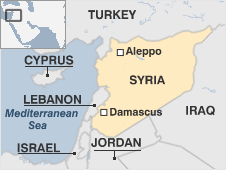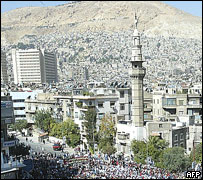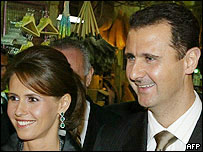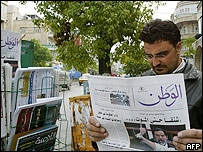Generic Medicines
Taj Pharma is the largest generic pharmaceutical company in India. We hold top positions in different established markets worldwide generics markets..
Once the centre of the Islamic Empire, Syria covers an area that has seen invasions and occupations over the ages, from Romans and Mongols to Crusaders and Turks.
 |
A country of fertile plains, mountains and deserts, it is home to diverse ethnic and religious groups, including Kurds, Armenians, Assyrians, Alawite Shias and Druze, as well as the Arab Sunnis who make up a majority of the Muslim population.
Modern Syria gained its independence from France in 1946 but has lived through periods of political instability driven by the conflicting interests of these various groups.
For a while, from 1958-61, it united with Nasser's Egypt, but an army coup restored independence before the Alawite-controlled pan-Arab Baath (Renaissance) party took control in 1963. It rules to this day.
AT-A-GLANCE
 Politics: Political power is held by a small elite, the opposition is repressed and the economy is centrally planned
Economy: The government has made reform of its under-performing, state-run economy a top priority
International: Syria withdrew troops from Lebanon in 2005 after three decades; the US has imposed sanctions on Syria, accusing it of supporting terrorism; Syria is one of Israel's staunchest enemies
|
Baath government has seen authoritarian rule at home and a strong anti-Israeli policy abroad, particularly under former President Hafez al-Assad. In 1967 Syria lost the Golan Heights to the Israelis, while civil war in neighbouring Lebanon allowed it to extend its political and military influence in the region.
Syria pulled its forces out of Lebanon in 2005, having come under intense international pressure to do so after the assassination of Lebanese former premier Rafik Hariri. A UN report implicated Syrian and pro-Syria Lebanese officials in the killing. Damascus denied any involvement.
The government has dealt harshly with domestic opposition. Thousands are thought to have been killed in the crackdown on the 1982 uprising of the Muslim Brotherhood in Hama.
Following the death of Hafez al-Assad, Syria underwent a degree of relaxation. Hundreds of political prisoners were released. But the granting of real political freedoms and a shake-up of the state-dominated economy have not materialised.
On the world stage Damascus has been increasingly isolated in recent years, having come under fire for its alleged support for insurgents in Iraq, and over its role in Lebanon. That isolation appears to be easing after efforts by France to bring Syria back into the international fold.
Syria is one of Israel's staunchest enemies and supports a number of militant groups that carry out attacks against Israel. Their current relationship founders on the continued occupation by Israel of the Golan Heights - Syrian land taken in the 1967 war.
Peace talks between the two countries stalled in January 2000, but indirect talks resumed under Turkish auspices in 2008. These were suspended pending the formation of a new Israeli government.
President: Bashar al-Assad
Bashar al-Assad would probably have been working as an optician had his brother not died in a car accident in 1994.

President Bashar al-Assad with his wife Asma
|
The death of Basil - groomed to succeed his father, President Hafez al-Assad - catapulted the younger brother into politics, and into the presidency after his father died in June 2000.
During his six-year political apprenticeship, Bashar al-Assad completed his military training, met Arab and other leaders and got to know the movers and shakers in Syrian politics.
On taking office he ushered in a brief period of openness and cautious reform. Political prisoners were released and restrictions on the media were eased. Political debate was tolerated and open calls for freedom of expression and political pluralism were made.
But the pace of change alarmed the establishment - the army, the Baath party and the Alawite minority. Fearing instability and perceiving a threat to their influence, they acted not only to slow it down, but to revert to the old ways.
A referendum in 2007 endorsed him as president for a second seven-year term. He was the only candidate.
Bashar al-Assad was born in 1965, the third of President Hafez al-Assad's children. He studied in Damascus and London. Shy and private, he was brought up outside the political spotlight, seemingly destined for a quiet life.
The government and Baath party own and control much of the Syrian media. Criticism of the president and his family is banned and the domestic and foreign press are censored over material which is deemed to be threatening or embarrassing. Journalists practice self-censorship and foreign reporters rarely get accreditation.

Most of Syria's media are controlled by the government or ruling party
|
Despite this, analysts see improvements in the media landscape. There was a brief flowering of press freedom after Bashar al-Assad became president in 2000. For the first time in nearly 40 years private publications were licensed. The new titles included political party papers and a satirical journal.
But a subsequent press law imposed a range of restrictions, and publications could be suspended for violating content rules.
Syrian TV has cautiously begun carrying political programmes and debates featuring formerly "taboo" issues, as well as occasionally airing interviews with opposition figures.
Applications have been lodged for licences for new private satellite TV channels to operate in a free media zone set up in Damascus. Satellite receivers are widely used, and many viewers tune into pan-Arab TV stations.
Private, commercial FM broadcasters have been given the green light, but stations cannot transmit news or political content.
With 2.1 million internet users in Syria by 2008 (ITU figure), the web has emerged as a vehicle for dissent.
However, in the view of the Paris-based media freedom watchdog Reporters Without Borders, "Syria is one of the worst offenders against internet freedom and censors opposition and independent news websites."
The Syrian opposition abroad have an outlet in the form of Radio Free Syria, a shortwave broadcaster which is operated by the US-based Reform Party of Syria.
The press
Television
Radio
News agency
Syrian Arab News Agency (Sana) - state-run, in Arabic, English and French
AFRICA | ASIA-PACIFIC | AMERICAS | EUROPE | MIDDLEEAST | SOUTHASIA
![]()
![]()
![]()
Mauritania Mauritius Morocco Mozambique Namibia Niger Nigeria Republic-of-congo Rwanda Sao-tome-and-principe Senegal Seychelles Sierra-leone Somalia South-africa Sudan Swaziland Tanzania The-gambia Togo Tunisia Uganda Australia Brunei Burma Cambodia China East-timor Fiji Indonesia Japan Kazakhstan Kiribati Kyrgyzstan Laos Malaysia Marshall-islands Micronesia Mongolia Nauru New-zealand North-korea Palau Papua-new-guinea Samoa Singapore Solomon-islands South-korea Taiwan Tajikistan Thailand The-philippines Tonga Turkmenistan Tuvalu Uzbekistan Vanuatu Vietnam Antigua-and-barbuda Belize Bolivia Brazil Canada Chile Colombia Costa-rica Cuba Dominica Dominican-republic Ecuador El-salvador Grenada Guatemala Guyana Haiti Honduras Jamaica Mexico Nicaragua St-kitts-and-nevis St-lucia Suriname Trinidad-and-tobago Uruguay Venezuela Albania Andorra Armenia Austria Azerbaijan Belarus Belgium Bosnia-hercegovina Bulgaria Croatia Cyprus Czech-republic Denmark Estonia Finland France Georgia Germany Greece Hungary Iceland Ireland Italy Latvia Liechtenstein Lithuania Luxembourg Macedonia Malta Moldova Monaco Montenegro Norway Poland Portugal Russia San-marino Serbia Slovakia Slovenia Spain Sweden Algeria Egypt Iran Iraq Israel-and-palestinian-territories Jordan Kuwait Lebanon Libya Mauritania Oman Saudi-arabia Sudan Syria Tunisia United-arab-emirates Yemen Afghanistan Bangladesh Bhutan India Nepal Pakistan Sri-Lanka The-Maldive